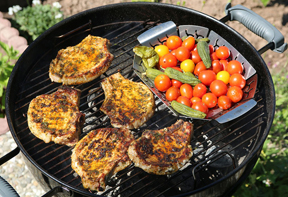
Even though summer is slowly coming to an end, grilling will continue to be a popular way to cook for many weeks to come. Grilling is a great way to prepare food while enjoying the outdoors…but it is not without risk. According to the National Fire Protection Association (NFPA), in 2014 alone, over 16,000 people visited the emergency room for injuries sustained while grilling. And with continued fair weather, the number of grilling related injuries is sure to rise.
Thankfully, there are some tips and tricks on how to avoid injuries while grilling outdoors. Here are some of the more common injuries, causes, and steps you can take to avoid injury during your next barbecue.
Burns & Blisters
Grilling season can also be burn season, due to the widespread use of grills during outdoor parties. Burns are the most common injury associated with grilling. The NFPA says that more than half of the ER visits in 2014 were thermal burns. A serious burn over a large portion of your body calls for an immediate trip to the ER, but smaller burns can be treated at your local AFC Urgent Care. Be particularly aware if the burn involves a small child or a senior citizen.
What not to do: That old wives tale about applying butter to a burn — don’t do it! The butter will only slow the release of heat from your skin making the pain worse. Also, avoid icing the wound. It slows blood flow to the area and can damage tissue further.
Fire & Smoke
How many times have you lifted the lid to your grill to check on your chow only to see a wall of flames billowing up toward you? Corneal burns (burns to the surface of the eye) aren’t common, but they can happen. So be sure to maintain a safe distance when opening a closed grill. Also, under-the-lid smoke! Lifting off that lid to look at your lamb chops only to inhale a lungful of smoke usually will land you with a fit of coughing, not necessarily a trip to urgent care. But, if you find you continue to have trouble breathing, it’s best to get checked out.
Careful Cutting
Not all cookout injuries happen outside by the grill. Some of them happen during the prep. It’s tempting to talk and enjoy spending time with your friends while you’re preparing foods, but when it comes to cutting or chopping, you’re better off paying close attention. The National Food Service Management Institute provides us with some simple safety tips for using a knife:
• Always use a cutting board. You might consider putting a dishtowel underneath the board to keep it from slipping.
• Sharper blades are safer than dull ones, because dull blades require more pressure to work with.
• Choose the correct size knife for the job.
• Don’t hold food while you cut it and keep your fingers on top of the blade.
• Keep knife handles free of grease or other slippery ingredients.
• Never try to catch a falling knife. To hand a knife to someone else, place it on the counter and let them pick it up.
• Wash knives immediately. Never put them in a sink of soapy water. Always store them in a block or case, never in a drawer.
A deep cut or puncture may necessitate a visit to an urgent care for evaluation and treatment.
Here’s a tip in case of accidental amputation: The American Academy of Orthopaedic Surgeons tells us to first gently clean the amputated part with water or a sterile solution. Next, cover it with a moistened gauze wrap and place it in a watertight bag. Finally, put the bag on ice. Do not allow the amputated part to be in direct contact with ice. You could damage it further.
Be Careful With Wire Brushes
Keeping your grill clean is a simple way to keep the food you cook on it safe and reduce the chance of fire flare-ups, but did you know that what you use to clean your grill with could be dangerous? A study published by the American Academy of Otolaryngology (Head and Neck Surgeons) found that injuries caused by wire-bristle grill brushes were uncommon, but prevalent enough for consumers to be made aware of the dangers associated with their use. Basically, they found that vigorous scrubbing of the grill with the wire-bristle brush could cause some of those bristles to be left behind on the grill. If you don’t notice them, they can stick to food you’re cooking and become accidentally ingested!
If you’ve been hurt at a barbecue, or have other cooking related injuries, get yourself seen by an AFC physician at a clinic near you. AFC Urgent Care locations are open 8am to 8pm weekdays, and 9am to 6pm on weekends so you can be seen right when you need care. Click here to learn more and find a location near you.


